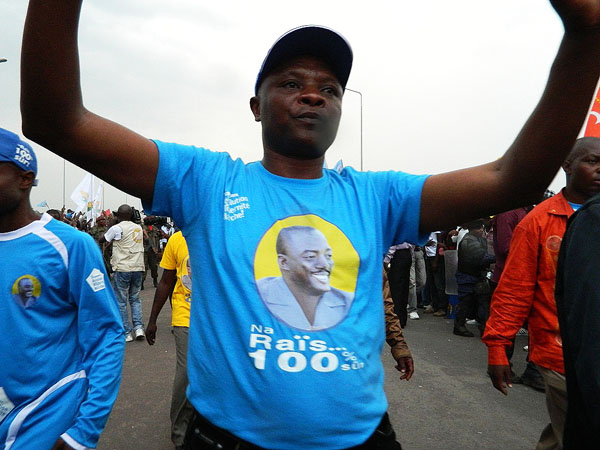
GOMA, Democratic Republic of Congo — Since the Congolese presidential race was officially launched on October 28, incumbent President Joseph Kabila’s ruling coalition has vowed victory. Recently, presidential contender Etienne Tshisekedi has followed close on Kabila’s heels by proclaiming himself the new president of Congo and calling upon his followers to rise up and free supporters who are currently imprisoned in Kinshasa. And while electoral campaign violence flares up in areas such as Lubumbashi, where clashes between supporters of Kabila’s PPRD party and Tshisekedi’s UDPS led to 16 deaths and considerable damages, officials and onlookers are becoming increasingly concerned about increased foul-play and violence threatening free and fair elections in Congo.
Nothing could be a better illustration of such activity than the recent kidnapping of traditional Hunde singer Fabrice Masumbuko in Goma. Several reports, including from the singer’s relatives, alleged that President Kabila’s presidential guards carried out the kidnapping. The singer’s only alleged crime was to have produced electoral campaign songs for opposition figures. But given the current administration’s strategy of rewarding violence within its ranks, Fabrice’s disappearance has confirmed a deep-rooted mindset from Kinshasa that enemies of Kabila will only respond to force. A public demonstration, combined with threats of assault on Goma by Mai-Mai General Janvier if the singer was not released within 48 hours, posed an imminent challenge both to stability in North Kivu and the electoral process nationwide.
In addition, Fabrice’s kidnapping should have been taken up by the country’s courts. But to the disappointment of local human rights groups who hoped to see President Kabila seize the opportunity to clear his name, it was presidential emissaries, including social minister Ferdinand Kambere and senator and presidential legal advisor Balikwisha Nyonyo who were dispatched to meet the singer’s relatives and extend an offer to take Fabrice outside the country for a checkup—solidifying popular opinion that Kinshasa was responsible for the abduction.
Statements made by Fabrice after he met with the incumbent president’s delegates are perhaps even more revealing of the likely hand behind his kidnapping:
While my vote is secret, I have never refused to sing for president Joseph Kabila, and have always been supporting of him. We’re behind him and respect and obey him because he’s our president. He’s done so much to restore peace in this region… I don’t know Vital Kamerhe (Kabila’s main challenger). I know of him as any other Congolese. But we further ask the president to keep working on restoring peace so that practices like these (kidnapping people) may stop and those who commit them do not get away with them.
The protests sparked by Fabrice’s kidnapping sent a strong signal from participants that there must be a priority placed on ending impunity in the East, particularly at this time when those vying for the president’s seat are trying all manner of tactics to win people’s votes for the November 28 elections. The Enough Project recently met with the state prosecutor in Goma and found that even a preliminary investigation into Fabrice’s kidnapping had yet to take place.
Electoral campaign related violence is an ominous sign for free and fair results. In Kinshasa, Archbishop Laurent Monsengo Pasinya said in reaction to campaign violence following Etienne Tshisekedi’s call on supporters to rise up and free political prisoners:
People provoke one another; they arm themselves with machetes and sometimes guns. People break and burn things as if they were in front of enemies lined up for battle; as if the end result of the election was to destroy the country instead of building it; as if the elections goal was to kill instead of safeguarding and promoting life. We can’t help condemning and denouncing schemes that are within an arc of barbarism. We insistently ask all parties to show restraint, wisdom, and democratic spirit. (Otherwise) how could we trust leaders incapable of protecting the population? How could we elect rulers who don’t give us peace, justice, and truth?
Prior to those remarks, UNHCR representative Scott Campbell warned that the agency had documented 148 electoral process related human rights violations by Congolese security forces, including the police and the secret services, against opposition parties including the National Congolese Union, or UNC, and the Democracy and Social Progress Union, or UDPS.
Inside the territory of North Kivu, Congolese army units haven’t avoided violating Congolese electoral law. The civil society in Walikale, and in Kirolirwe, Kichanga, and Mweso in Masisi recently sounded the alarm that military units—mainly ex-CNDP—were displaying campaign materials and wearing t-shirts supporting President Kabila. Military units in Walikale have also held concerts where brand new bank notes have been distributed along with Joseph Kabila’s posters. In all cases the units were asking the people to vote for Kabila.
Overwhelmed by violence and breaches of electoral law, the chairman of the national electoral commission, Pastor Daniel Ngoy Mulunda, has even called on the International Criminal Court to come and help monitor electoral campaign violations.
Photo: A supporter of President Kabila cheers in the street during the president's visit to Goma (Enough/Fidel Bafilemba)

